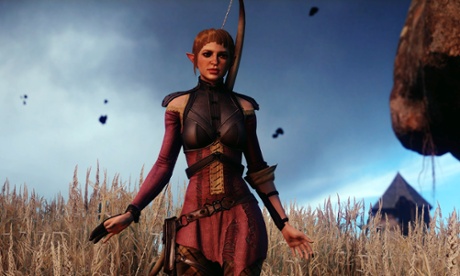
Even though BioWare is among the acknowledged masters of the role-playing genre, Dragon Age has never received the public adulation accorded to its other key franchise, Mass Effect. This is perhaps because it has not quite measured up to the quality of its big rival, Bethesda’s Elder Scrolls series.
However, Dragon Age: Inquisition, due to hit the shops this October, will be the first major fantasy RPG for next-gen consoles, and has a window in which it can prosper before the next instalment of Elder Scrolls (unless you count the PS4 and Xbox One versions of the massively multiplayer Elder Scrolls Online).
The latest instalment in the action RPG series wasn’t playable at E3, but we were privy to an extensive demo. And early indications suggest that it may well generate a more fanatical audience than its predecessors.
Vast explorable worlds
It looks magnificent, with giant open environments dwarfing the landscapes in previous iterations. Story-wise, it sounds interesting, too: the land is beset by an all-out war between Mages and Templars, and you play an Inquisitor, assembling and deploying an Inquisition team whose mission is to stop the world from tearing itself apart. Both figuratively, in terms of the civil war, and literally, as a number of “breaches” appear, causing a demonic world to encroach on the idyllic countryside.
There’s no doubt it will be a huge game, with all manner of side-quests and systems allowing you to extend your influence in the world. It’s important to establish the Inquisition as a force in the world – it means you can send out agents to recover resources and win over territory, via an interface called the War Table. What you do there, according to BioWare, will influence the course of the storyline. There’s a new crafting system, too, allowing you to create custome weapons and armour. An ecological angle has also been added: you can spend hours hunting bears, but the more you do so, the more their numbers will dwindle.
Combat-wise, Dragon Age: Inquisition impresses. It defaults to an over-the-shoulder third-person view, and you can switch between the members of your party for a strategic edge. For finer control – particularly useful in the midst of big battles – the tactical overview mode has returned, freezing the action and letting you set up orders for each member of your party. The game also contains more than 200 talents and spells for you to acquire.
You can choose between four races and three classes, and as a “Leader of leaders” you can also build a party of warriors with specific skills and plenty of personality. BioWare always strives to make the characters in Dragon Age games complex and finely drawn, and likes to take a more mature approach than many RPGs, so you will be able to initiate romances.
Exclusives and dragons
Dragon Age: Inquisition looks every inch the meaty, state-of-the-art, grown-up RPG that its predecessors aspired to be. It may finally propel the franchise towards the heights that BioWare has always envisaged for it. That may be particularly true on the Xbox One, as Microsoft's console will feature exclusive content and is set to get any DLC before PlayStation.
As for dragon's, well, we're promised many more than previous titles, with different breeds and re-designed combat. They'll smash down buildings and burn the land. BioWare has clearly learned plenty from Skyrim; it'll be interesting to see what it can now teach us about RPGs in the next-gen era.
• Dragon Age: Inquisition is released on PC, PS3, PS4, Xbox 360 and Xbox One on 7 October.

